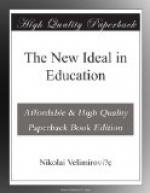COLLECTIVE WORKS
Are greater than personal works. A pupil from the old, individualistic school would object:
—And what do you think of the work of Ibsen?
I: I think it is incomparably smaller than the ancient Scandinavian legends.
He: Do you not grant that Alfred the Great was the real creator of the English Kingdom?
I: Never. Millions and millions of human creatures are built into this building that we call England, or English history, or English civilisation.
He: And what about the man who built St. Paul’s Cathedral?
I: It is a collective work, as are all the great works that have been done. The architecture of St. Paul’s is one of the ancient styles, and no style in architecture was ever invented or created by one person, but by generations and generations.
He: And what about Victor Hugo and Milton? Are they not great poets?
I: Yes, they are if compared with certain minor poets, but they are not great if compared with the popular poetry of India or Greece. Mahabarata, the Koran, and Zend-Avesta, and the Bible, are products of collective efforts—therefore they are superior to every personal effort.
He: Do you not appreciate the great economists and what they did for the household, and common-wealth in general?
I: Certainly I do; but their work is too much overestimated. Not a handful of economic writers, like Adam Smith and Marx, but the common genius of generations and generations arranged the house, set the furniture, created the cooking, constructed towns, invented plays and enjoyments, customs, language, and so forth.
He: You agree, I think, that Shaljapin and Caruso have wonderful voices, don’t you?
I: Yes, I agree. But don’t you agree that a choir of millions of human voices would be something much more striking and wonderful than any solo singer since the beginning of time?
He: Don’t you believe in the wisdom of wise men like Kant and Spencer?
I: No, I don’t. I think there is incomparably more healthy and more applicable wisdom in the popular sayings, proverbs, parables, and tales of the nations, cultivated and uncultivated, in Macedonia, Armenia, Ceylon, New Zealand, Japan, &c., than in some dozen of the greatest thinkers of Europe.
He: Who is then in your opinion a great man?
I: Only a good man is a great man to me, who is conscious that he is a cell in the panhuman organism, or a brick in the building of human history. Such a man is more a man of truth and of the future than any conqueror, who thinks that a hundred millions of people and hundreds of years have waited just for him and his guidance, his work, or his wisdom.
That is what I would say to a pupil of individualism in education. And at the end I would remind him of Christ and His call after the children, and of the new ideal of education, of panhumanism which stands over individualism, and of the collective work of people which stands over every individual work and merit.




